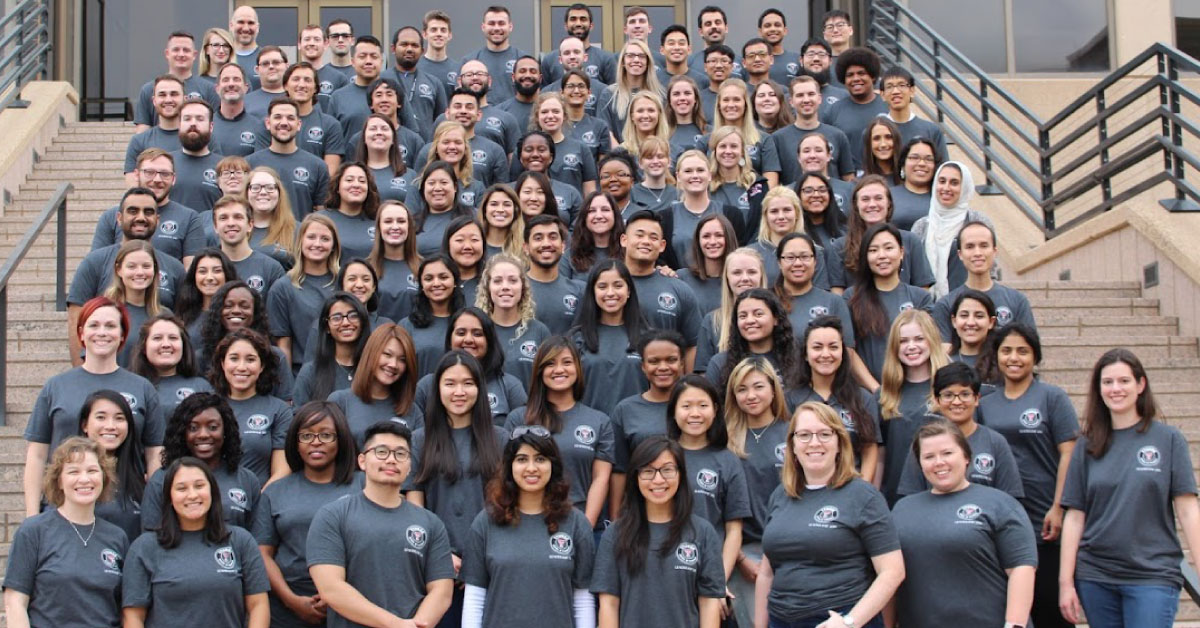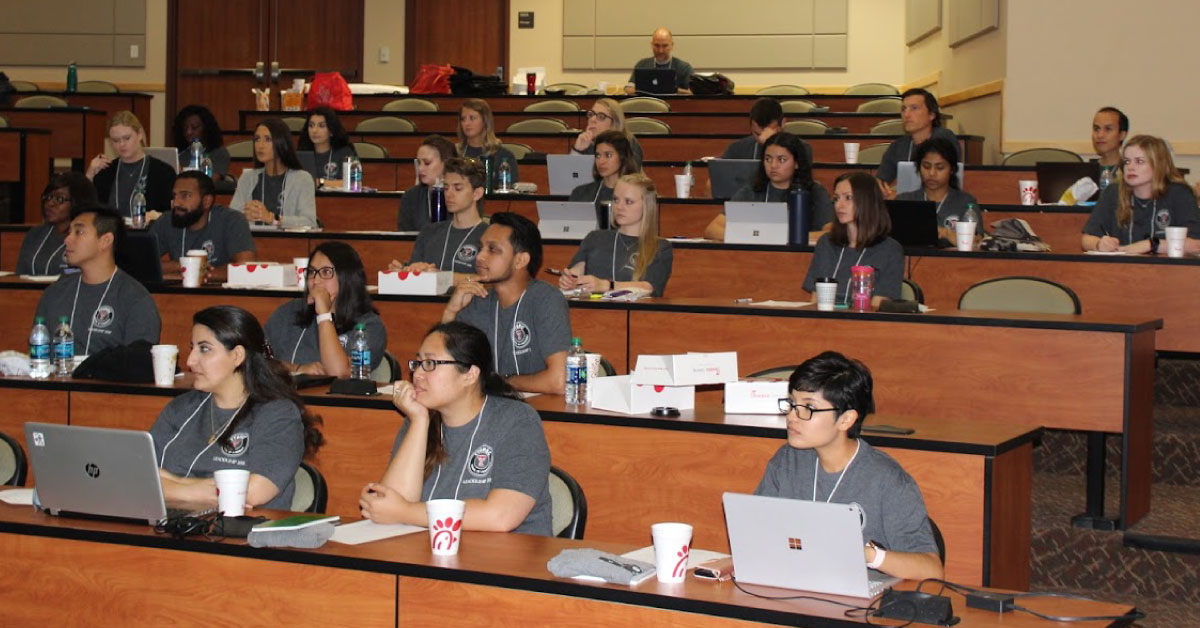Lubbock Hosts Annual Pharmacy Student Leadership Retreat
 More than 100 students and 21 faculty members representing all four School of Pharmacy campuses met Aug. 17-18 in Lubbock for the school’s annual Student Leadership Retreat.
The group included 18 first-year pharmacy students and Quentin Smith, Ph.D., the School
of Pharmacy dean.
More than 100 students and 21 faculty members representing all four School of Pharmacy campuses met Aug. 17-18 in Lubbock for the school’s annual Student Leadership Retreat.
The group included 18 first-year pharmacy students and Quentin Smith, Ph.D., the School
of Pharmacy dean.
A planning committee comprised of seven leaders from the Phi Lambda Sigma student organization, one at-large student, five at-large faculty members and Office of Professional Affairs faculty Krystal Edwards, Pharm.D., and Kenna Payne, Pharm.D., planned and developed the 2018 retreat theme that focused upon dealing with the difficult and often uncomfortable challenges that leadership can bring.
Logan Winkelman, associate director for the Texas Tech University (TTU) Career Center, kicked off the retreat by helping attendees discover their top strengths utilizing StrengthsFinders, a personality assessment tool developed from the positive psychology perspective. The opening morning also included a session led by Steve Sosland, TTUHSC’s vice president for human resources and chief people officer, who discussed building organizational culture and the challenges of leadership.
Winkelman also led an afternoon breakout session that discussed how to engage one’s strengths to face leadership challenges. The afternoon schedule also included breakout sessions about leading with humility, how to spend time and energy while leading, and leading without a title. An evening cookout at TTU’s Urbanovsky Park capped off the first day.
 The second day opened with an interactive small-group breakout session titled, “Challenging
Yourself - Stepping Out of Your Comfort Zone,” that was created and led by fourth-year
(P4) student Jennifer Rivas with assistance from P4 Lydia Girgis and assistant professors
Mary Klein, Pharm.D., Brian Terrell, Pharm.D., and Teryn Bibb, Pharm.D. Additional
day two morning sessions dealt with leadership burnout, young versus old, stepping
back and letting others take over leadership, the influence of gender in leadership
and handling difficult people and conflict resolution.
The second day opened with an interactive small-group breakout session titled, “Challenging
Yourself - Stepping Out of Your Comfort Zone,” that was created and led by fourth-year
(P4) student Jennifer Rivas with assistance from P4 Lydia Girgis and assistant professors
Mary Klein, Pharm.D., Brian Terrell, Pharm.D., and Teryn Bibb, Pharm.D. Additional
day two morning sessions dealt with leadership burnout, young versus old, stepping
back and letting others take over leadership, the influence of gender in leadership
and handling difficult people and conflict resolution.
After Smith and Lubbock Regional Dean Charles Seifert, Pharm.D., opened the afternoon with a general address to students, Department of Pharmacy Practice Chair Eric MacLaughlin, Pharm.D., led a session about innovations in leadership. The retreat’s final two final sessions discussed how to empower others to lead and how leaders can self reflect, evaluate and debrief.
Prior to ending the retreat with an ice cream social, Edwards and Payne presented a take-home assignment for leadership in action that challenged the students to work together as a campus and engage their peers to increase community involvement and participation.
Related Stories
Celebrating Veterans: TTUHSC’s General Martin Clay’s Legacy of Service and Leadership
From his initial enlistment in the Army National Guard 36 years ago to his leadership in military and civilian health care management roles, Major General Martin Clay’s career has been shaped by adaptability, mission focus and service to others.
Texas Tech University Health Sciences Center School of Nursing Named Best Accelerated Bachelor of Science in Nursing Program in Texas
The TTUHSC School of Nursing Accelerated Bachelor of Science in Nursing (BSN) program has been ranked the No. 1 accelerated nursing program in Texas by RegisteredNursing.org.
TTUHSC Names New Regional Dean for the School of Nursing
Louise Rice, DNP, RN, has been named regional dean of the TTUHSC School of Nursing on the Amarillo campus.
Recent Stories
National Academy of Inventors Names TTUHSC Faculty Senior Members
The National Academy of Inventors (NAI) has designated two current and one former TTUHSC faculty researchers as Senior Members.
The John Wayne Cancer Foundation Surgical Oncology Fellowship Program at Texas Tech University Health Sciences Center Announced
TTUHSC is collaborating with the John Wayne Cancer Foundation and has established the Big Cure Endowment, which supports the university’s efforts to reduce cancer incidence and increase survivability of people in rural and underserved areas.
TTUHSC Receives $1 Million Gift from Amarillo National Bank to Expand and Enhance Pediatric Care in the Panhandle
TTUHSC School of Medicine leaders accepted a $1 million philanthropic gift from Amarillo National Bank on Tuesday (Feb. 10), marking a transformational investment in pediatric care for the Texas Panhandle.
